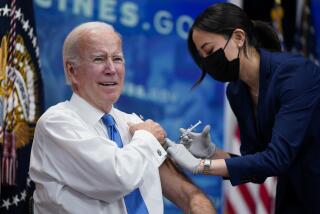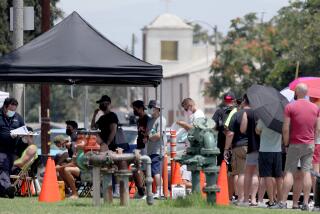U.S. to Offer Vaccine for Smallpox
WASHINGTON — President Bush will make the smallpox vaccination available to all Americans as a precaution against a possible bioterrorism attack, a senior administration official said Wednesday.
In a policy to be announced Friday, Bush will also order the vaccination of about 500,000 military personnel and set the stage for the inoculation of another 500,000 front-line health-care workers -- the public health teams that would investigate smallpox cases and the doctors, nurses and hospital support personnel who would probably be the first to treat patients.
The general public is not expected to have access to the vaccine until early 2004, when sufficient doses have been fully licensed by the Food and Drug Administration.
While news of Bush’s long-awaited decision appeared to answer, for now, the question of who would have access to vaccine, it is also likely to heighten public awareness of the perceived bioterrorism threat and could sharpen U.S. allegations against Iraq, which is believed to possess the deadly virus.
“We are generally concerned about the potential that terrorists or certain states might have illegal stores of the smallpox virus and might use it,” said the administration official, who requested anonymity.
“World events play a role in this -- concerns about Iraq, concerns about other countries,” Jerome M. Hauer, acting assistant secretary of the Health and Human Services Department, said Wednesday.
“If the Iraqis don’t comply with the weapons inspectors and the president decides to be more forceful ... we don’t know how desperate [Iraqi President Saddam Hussein] might be,” said Hauer, who has been among those advising Bush and Vice President Dick Cheney about the vaccination issue.
Referring to Hussein as “truly a madman,” Hauer said: “A cornered dog becomes vicious. A rabid dog is even more dangerous. That’s what we’re dealing with with Iraq.”
Bush had been weighing the decision for months, carefully considering intelligence information and scientific data, Hauer said.
The key factor complicating the president’s decision was the danger of the vaccine itself, which contains live viruses.
A study found that at least 52 of every 1 million people vaccinated will suffer life-threatening side effects, such as severe skin infections leading to tissue destruction or inflammation of the brain, and roughly one of those will die.
“The issue is trying to balance the potential use of smallpox as a biological weapon with the known adverse effects of this vaccine,” Hauer said.
The unnamed senior administration official said the timing of the president’s decision was directly connected to the resolution of several key questions.
The White House wanted to make sure, for example, that the manufacturers of the vaccine and the health workers who administer it cannot be sued by people who suffer serious side effects or by relatives of those who die. The bill establishing a Homeland Security Department provided that indemnity.
In addition, the nation’s public health agencies are now better prepared to administer the vaccine. Last week, states submitted to the federal Centers for Disease Control and Prevention in Atlanta their plans for vaccinating as many as 1 million people each within 10 days of a smallpox outbreak. On Monday, they submitted plans that describe how many health workers at which hospitals would be vaccinated and thus prepared to administer the vaccine to others.
A final factor prompting the president’s decision this week, the senior administration official said, is that “more vaccine becomes licensed every day.”
The timetable for the three- or four-phase vaccination plan remained unclear Wednesday, but administration officials have said that military personnel would be the first to get the vaccine.
Front-line health-care workers are unlikely to begin receiving the vaccinations until at least Jan. 24, when the liability provision in the homeland security law takes effect. In addition to shielding manufacturers of the vaccine and those who administer it from lawsuits, the provision also establishes a process for filing injury claims against the federal government.
Sometime after that, the vaccine would likely be offered to all of the nation’s 7 million health-care workers and about 3 million police, fire and other emergency workers. Only after that would the public have access to the vaccine.
News of Bush’s decision first appeared Wednesday on ABC’s “World News Tonight,” which aired excerpts of a Barbara Walters interview with the president First Lady Laura Bush.
“I will have a detailed [vaccination] plan that the American people will digest,” the president told Walters. “I think it ought to be a voluntary plan.
“In other words, I don’t think people ought to be compelled to make the decision which they think is best for their family. And what’s going to be very important is for us to make sure that there’s ample information for people to make a wise decision.”
Friday’s announcement by the president also will kick off a broad education campaign designed to more fully inform citizens about the risks of smallpox -- and of the vaccine.
The United States stopped routine vaccinations of children in 1972. The disease, which kills roughly a third of its victims, was declared eradicated worldwide in 1980.
Adding to the vaccine’s known risks, however, is a changed population. As many as 30 million Americans -- people with skin diseases or immune systems compromised by HIV, chemotherapy and organ transplants -- are at risk for the life-threatening complications of the vaccine.
Results from a public opinion poll released Wednesday indicate that roughly six in 10 Americans are worried that smallpox could be used in a bioterrorism attack and two out of three are willing to be vaccinated.
But public health officials speaking at a bioterrorism conference here Wednesday predicted that the number will drop when Americans learn more about the vaccine’s risks.
Hauer estimated that the percentage interested in being vaccinated will fall from 65% to about 50%. After an “adverse event” -- public health lingo for a death or serious illness caused by the vaccine -- “people will think twice about” getting the vaccine, he said.
Walters on Wednesday asked Laura Bush whether she would have the couple’s twin daughters vaccinated.
“If the vaccine were available, which I think it will be, I would feel like that was certainly safe for them to do,” the first lady said.
More to Read
Sign up for Essential California
The most important California stories and recommendations in your inbox every morning.
You may occasionally receive promotional content from the Los Angeles Times.










